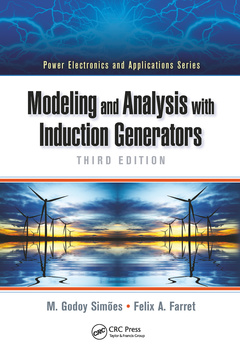Description
Modeling and Analysis with Induction Generators (3rd Ed.)
Power Electronics and Applications Series
Authors: Simões M. Godoy, Farret Felix A.
Language: English
Subjects for Modeling and Analysis with Induction Generators:
Keywords
Pa Ce; Wound Rotor Induction Generator; Small Hydro Power Plant; Induction Generator; Hydro Turbine; Self-Excited Induction Generators; Magnus Turbine; RLC Load; Wind Turbine; Equivalent Circuit; Induction Generator Alternative; Dc Link Voltage; Induction Generator Renewable; Induction Machine; Induction Generator Economics; Synchronous Speed; Maximum Power Point Tracking Method; Matrix Converters; Induction Generator Use; Dc Link; Induction Generator Application; Stator Ux; Small Electrical Power Plant Simulation; Grid Side Converter; Induction Generator Simulation; Synchronous Generator; Induction Generator Model; Squirrel Cage Rotor; Dc Dc Converter; Optimized Control Induction Generator; Energy Sources; Vector Control Induction Generator; TSR; Scalar Control Induction Generator; Synchronous Rotating Reference Frame; Interfacing Induction Generator; Static Var Compensator; Power Electronics Induction Generator; Induction Generator Construction; Dc Bus; Induction Generator Characteristic; Direct Vector Control; Conventional Synchronous Generator; Ballast Load; Permanent Magnet Synchronous Generator; Fuzzy Controller; Doubly Fed Induction Generator; Stand-Alone Induction Generator; Self-Excitation Capacitor; Self-Excited Induction Generator; Magnetizing Inductance Saturation; Transient Model Induction Generator; Steady-State Model Induction Generator; Electric Generation; Renewable System; Renewable Energy; Alternative System; Alternative Energy; Wind energy; Smart grid; Power electronics for distributed generation; Scalar control of induction machines; Vector control of induction machines; Power quality
67.43 €
In Print (Delivery period: 14 days).
Add to cartPublication date: 03-2021
· 15.2x22.9 cm · Paperback
148.11 €
In Print (Delivery period: 15 days).
Add to cartPublication date: 02-2015
· 15.2x22.9 cm · Hardback
Description
/li>Contents
/li>Readership
/li>Biography
/li>
Now in its Third Edition, Alternative Energy Systems: Design and Analysis with Induction Generators has been renamed Modeling and Analysis with Induction Generators to convey the book?s primary objective?to present the fundamentals of and latest advances in the modeling and analysis of induction generators.
New to the Third Edition
- Revised equations and mathematical modeling
- Addition of solved problems as well as suggested problems at the end of each chapter
- New modeling and simulation cases
- Mathematical modeling of the Magnus turbine to be used with induction generators
- Detailed comparison between the induction generators and their competitors
Modeling and Analysis with Induction Generators, Third Edition aids in understanding the process of self-excitation, numerical analysis of stand-alone and multiple induction generators, requirements for optimized laboratory experimentation, application of modern vector control, optimization of power transference, use of doubly fed induction generators, computer-based simulations, and social and economic impacts.
Principles of Alternative Sources of Energy and Electric Generation. Steady-State Model of Induction Generators. Transient Model of Induction Generators. Self-Excited Induction Generators. General Characteristics of Induction Generators. Construction Features of Induction Generators. Power Electronics for Interfacing Induction Generators. Scalar Control for Induction Generators. Vector Control for Induction Generators. Optimized Control for Induction Generators. Doubly Fed Induction Generators. Simulation Tools for Induction Generators. Applications of Induction Generators in Alternative Sources of Energy. Economics of Induction Generator–Based Renewable Systems.
M. Godoy Simões holds a B.Sc, M.Sc, and D.Sc (Livre-Docência) from the University of São Paulo, Brazil, and a Ph.D from the University of Tennessee, Knoxville, USA. An IEEE senior member, Dr. Simões currently works at the Colorado School of Mines, Golden, USA, and is director of the Center for Advanced Control of Energy and Power Systems. Widely published and highly decorated, he was recently awarded a Fulbright Fellowship to conduct research and educational activities at the University of Aalborg, Denmark. Previously, Dr. Simões was a faculty member at the University of São Paulo.
Felix A. Farret received bachelor’s and master’s degrees in electrical engineering from the Federal University of Santa Maria (UFSM), Brazil. He specialized in electronic instrumentation at Osaka Prefectural Industrial Research Institute, Japan; earned an M.Sc from the University of Manchester, UK; received a Ph.D from the University of London, UK; and did a postdoctoral program at the Colorado School of Mines, Golden, USA. Widely published, he is currently a professor at UFSM. Previously, he worked as an engineer at the State Electric Power Company, Rio Grande do Sul, Brazil, and was visiting professor at the Colorado School of Mines.
These books may interest you

Induction Machines Handbook 318.89 €



